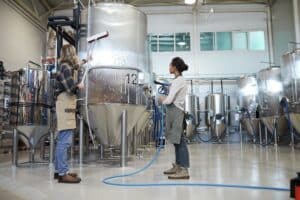In recent years, the brewing industry has witnessed a paradigm shift as it strives to align with global sustainability goals. Brewers around the world are embracing eco-friendly practices, leveraging cutting-edge technologies, and adopting innovative solutions to reduce their environmental footprint. This blog post explores the implementation of sustainable practices in beer brewing, with a focus on the role of technology, including Warehouse Management System (WMS) software and reusable containers.
The Rise of Sustainability in Brewing:
Sustainability is no longer a mere buzzword but a guiding principle for breweries looking to make a positive impact on the environment. As consumers become increasingly conscious of the ecological consequences of their choices, breweries are seizing the opportunity to lead the way in sustainable brewing practices.
Challenges Addressed by Sustainable Brewing:
Resource Efficiency:
Breweries face the challenge of optimizing resource use, including water, energy, and raw materials. Sustainable practices aim to minimize waste and maximize efficiency throughout the brewing process.
Waste Management:
Waste generated in brewing, including spent grains and packaging materials, has significant environmental implications. Sustainable breweries focus on reducing, reusing, and recycling to divert waste from landfills.
Carbon Footprint:
The energy-intensive nature of brewing contributes to a substantial carbon footprint. Adopting sustainable energy sources and reducing overall energy consumption are key goals for environmentally conscious breweries.
Leveraging Technology for Sustainable Brewing:
Warehouse Management System (WMS) Software:
The implementation of a robust WMS software is a game-changer for breweries aiming to streamline operations, enhance efficiency, and reduce waste.
Inventory Optimization:
WMS software provides real-time visibility into inventory levels, helping breweries optimize stock levels and prevent overproduction or stockouts. By maintaining accurate inventory data, breweries can reduce waste and improve resource planning.
Batch and Lot Tracking:
WMS allows for precise batch and lot tracking, ensuring the traceability of ingredients throughout the brewing process. This capability is crucial for quality control and compliance with regulations, contributing to a sustainable and transparent supply chain.
Dynamic Replenishment:
Automated replenishment triggers based on inventory levels help breweries manage their stock efficiently. This not only prevents production delays due to stock shortages but also aids in reducing excess inventory, minimizing waste.
Cross-Docking Capabilities:
Cross-docking features in WMS facilitate the swift movement of materials from receiving to outbound shipping, reducing storage time and minimizing the environmental impact associated with prolonged storage.
Energy-efficient Operations:
By optimizing warehouse layouts and implementing energy-efficient technologies, WMS contributes to overall energy savings. Automated processes and smart routing reduce the need for unnecessary equipment movement, minimizing energy consumption.
Reusable Containers:
Embracing reusable containers is a cornerstone of sustainable brewing. From kegs to packaging materials, breweries are increasingly adopting a circular approach to container usage.
Keg Management Systems:
Implementing keg tracking systems within a WMS enables breweries to efficiently manage and monitor the lifecycle of kegs. This includes tracking keg movements, cleaning schedules, and ensuring the timely return of kegs for reuse.
Eco-friendly Packaging:
Reusable packaging materials, such as glass or PET bottles designed for multiple uses, contribute significantly to sustainability. Breweries are exploring innovative packaging solutions that prioritize durability and recyclability.
Reduced Single-Use Plastic:
The reduction of single-use plastic in brewing operations is a growing trend. Breweries are exploring alternatives like compostable packaging materials and investing in technologies that minimize the environmental impact of packaging.

Case Studies: Breweries Leading the Way in Sustainable Brewing:
Sierra Nevada Brewing Co.:
Sierra Nevada has invested in a state-of-the-art WMS to optimize inventory control, reduce waste, and enhance overall efficiency. Their commitment to sustainability extends to energy production, with a large solar array powering a significant portion of their operations.
New Belgium Brewing:
New Belgium Brewing, known for its iconic Fat Tire Amber Ale, has pioneered sustainable brewing practices. Their commitment to reducing their carbon footprint includes initiatives like waste diversion, energy-efficient brewing processes, and the use of reusable packaging.
BrewDog:
BrewDog, a global craft brewery, has incorporated sustainable practices into its operations. From its innovative approach to beer production, including the use of wind power, to its commitment to reducing packaging waste, BrewDog exemplifies the integration of sustainability and technology in brewing.
The Road Ahead: Sustainable Brewing as a Standard:
As the brewing industry navigates the challenges of the 21st century, sustainability is not merely a choice but a necessity. Breweries are increasingly recognizing that embracing sustainable practices is not only an ethical obligation but also a strategic advantage. Technology, including WMS software and reusable containers, is at the forefront of this transformation.
Continuous Innovation:
The marriage of technology and sustainability is a dynamic space. Breweries must commit to continuous innovation, staying abreast of the latest advancements in WMS, automation, and eco-friendly materials.
Collaboration and Knowledge Sharing:
Breweries can collaborate with technology providers, industry experts, and sustainability organizations to share best practices, knowledge, and experiences. This collective approach fosters a culture of innovation and progress.
Consumer Education:
Communicating the sustainability initiatives of breweries is crucial for consumer awareness and appreciation. Breweries can leverage technology to transparently share information about their eco-friendly practices, building trust and loyalty among consumers.
Industry Standards and Certification:
The brewing industry can work collectively to establish and adhere to sustainability standards. Certifications and eco-labels can help breweries showcase their commitment to environmental stewardship and responsible brewing.
Conclusion:
Sustainable brewing is not a distant ideal but a tangible reality achievable through the integration of technology, innovation, and a commitment to environmental responsibility. Breweries that embrace sustainable practices powered by technology are not only reducing their ecological footprint but are also positioning themselves as leaders in an industry that recognizes the imperative of brewing for a better tomorrow. As the brewing landscape evolves, the harmonious blend of technology and sustainability will undoubtedly define the future of brewing, setting the standard for environmentally conscious production practices.
















